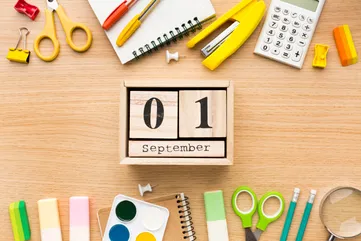Time Estimation
Time estimation is the ability to predict how long tasks will take to complete, essential for planning, scheduling, and meeting deadlines effectively.
You're not alone
If your teen insists they only need 20 minutes for homework then emerges three hours later, or consistently runs late despite believing they have plenty of time, you're dealing with universal time estimation challenges. Research shows teens typically underestimate task duration by 50 percent or more. This skill improves with practice and brain development. Creating systems to compensate for poor estimation is more effective than expecting sudden accuracy.
What it looks like day to day
Student
Your teen schedules back-to-back activities with no transition time, genuinely surprised when the plan falls apart.
Parent
You ask how long homework will take, your teen says "maybe an hour," and you know to mentally triple that estimate.
Tiny steps to try
- 1
Time logging
Track actual time for common tasks for one week. Create a reference sheet of real durations.
- 2
Multiplication rule
Teach your teen to multiply their estimate by 1.5 or 2. Build in buffer automatically.
- 3
Break-down method
Estimate each step separately then add together. Total is usually more accurate than overall guess.
- 4
History check
Before estimating, ask "How long did this take last time?" Past performance predicts future duration.
- 5
Timer challenges
Make estimation practice fun. "How long to clean your room?" Time it and compare.
Why teens underestimate everything
Teen brains consistently underestimate task duration due to optimism bias, limited experience, and underdeveloped temporal processing regions.
Time estimation errors:
• Thinking homework takes 30 minutes when it takes two hours
• Planning to get ready in five minutes
• Believing they can write essays the night before
• Forgetting to account for transitions
• Ignoring setup and cleanup time
• Not considering mental fatigue
These aren't lies but genuine perception errors.
References
Kahneman, D., & Tversky, A. (1979). Intuitive prediction: Biases and corrective procedures. TIMS Studies in Management Science, 12, 313-327.
Ready to help your teen thrive?
Get personalized 1-on-1 coaching to build better habits and boost grades. Join 10,000+ families who trust Coachbit.
Frequently Asked Questions
Why does my teen estimate chores take forever but homework takes minutes?
Motivation distorts time perception. Enjoyable activities feel shorter; dreaded tasks feel longer. Teens overestimate unpleasant task duration while underestimating neutral or complex tasks. This "temporal distortion" is why they genuinely believe cleaning takes hours but essays take minutes. Address both sides of the estimation error.
Should I correct their estimates or let them fail?
Balance both approaches. For low-stakes situations, let natural consequences teach. For important deadlines, provide scaffolding: "Last week's essay took three hours. This one's longer." Share your own estimation process out loud. The goal is building internal accuracy through supported practice, not perpetual correction or harsh failure.
Related Terms
Executive Function
Executive function is your brain's management system that helps teens plan, focus, remember instructions, and juggle multiple tasks successfully.
Planning
Planning is the ability to create structured approaches for achieving goals by breaking them into steps, estimating time, and sequencing actions effectively.
Time Awareness
Time awareness is the ability to accurately perceive how much time has passed, estimate task duration, and understand time-related concepts for planning and scheduling.
Time Management
Time management is the ability to plan, prioritize, and use time effectively to accomplish tasks and meet deadlines without constant crisis.
Related Articles

Finding Order in the Chaos – Setting up Calendars for Kids
Creating a calendar and daily schedule for kids can be beneficial to manage school, homework, extracurriculars and hobbies. Color-coding and time-blocking are helpful tools for kids with ADHD.
Read article
3 Ways an Executive Functioning Coach Can Help Your Child
Discover why executive functioning skills are crucial for your child's success. Learn how an executive functioning coach can make a difference
Read article
